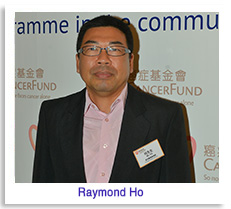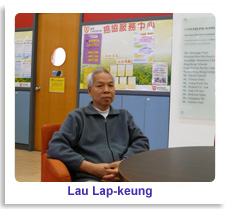
CancerLink changed things for me: Raymond Ho
"It was a shock when I was told I had prostate cancer at the age of 52. Both my parents and two elder brothers passed away from cancer, so I knew I was more at risk, but the result still came as a massive blow.
I was fearful and felt helpless. I couldn’t stop thinking negatively.
CancerLink changed things for me. They were a real support and comfort. There, I was able to find out all I needed to know about my treatment and side effects. I spoke to a peer ambassador who told me what to expect after my surgery.
Like many men, I was reluctant to talk about health issues and avoided the doctor. I just focused on my work and providing for my family. I now know that you can only really do this if you have your health. It’s so important to speak to a doctor if you have any symptoms or prostate concerns.
Since my recovery, I have been volunteering at CancerLink to help others learn from my experience. Talking to someone who had gone through a similar journey was so important for me. They helped me realise there’s no point wasting life by being worried all the time. There is life after prostate cancer and it’s important to get on and enjoy it.”

Like many diagnosed with cancer, Mike was initially stunned: Michael John Kennedy
Michael John Kennedy started having regular blood tests five years ago to check for prostate cancer – knowing full well that early detection can make all the difference in overcoming the disease. When his PSA levels started to rise, the 69-year-old semi-retired engineer underwent a biopsy last June, and discovered a malignancy in his prostate.
Like many diagnosed with cancer, Mike was initially stunned.
“I sort of fell off my chair. It was out of the blue,” said Mike, who has lived in Hong Kong for nearly 35 years since moving from London. “It all happened very quickly. This diagnosis and options for treatment were relayed to me in about 15 minutes in a consultation and I was completely taken aback, actually devastated, by it all.”
But as the initial shock faded, Mike and his wife resolved to stay positive and explore their options. His choices were two-fold: receive radiation treatment for six weeks, or undergo surgery to remove his prostate.
“I was not too keen on radiation treatment and I decided that if I was to have surgery then I should have it as soon as possible. I discussed all of this with my wife and she agreed. Both she and my grown up children were upset by the news,” he said.
He met with a second physician who detailed the benefits and drawbacks of each option. When the doctor said he could perform the surgery in almost a week, Mike decided to have his prostate removed. Because he lacked medical insurance, he used savings to help pay for the surgery. He underwent the procedure in August of last year.
However, Mike faced even more challenges ahead. “If anything, the operation was the easy part,” he said.
For the next two and a half months, Mike struggled with an inability to urinate, returning to the hospital four times for catheter insertions and laser treatment. Finally, after a number of minor operations and catheter treatments, this problem was resolved.
Perhaps even more difficult, he said, was the uncertainty he faced after the procedure. Mike had gone into the operation assuming he would likely be cancer-free once the prostate was removed. So, he was distressed to learn afterwards that, because the malignant cells had overtaken 10 percent of the prostate, there was a chance the cancer had spread to nearby parts of his body.
“They told me that the cancer may not be confined to the prostate. This was probably the most devastating thing for me to hear, and I was extremely upset,” he said. “They said we've done this procedure, but it may not have worked. So, I'd gone through all this, and it was like somebody had cut my leg off. I’d expected everything to be over, but it wasn't.”
To determine whether or not the surgery had eradicated the cancer, Mike would need to take blood tests one month, three months and six months after the procedure to gauge his PSA levels. The eternal optimist, Mike decided to remain upbeat and envisioned each of three tests coming back with a reading of 0.1ng/ml — a sign that would indicate the cancer was no longer in his body.
“I told all my friends and my family about the situation,” he said. “I decided it was going to be less than 0.1 and told them, ‘I want you to believe that,’ and they all came back to me saying, ‘Yes, you’re going to do it!”.
To further buoy his spirits, Mike wrote on a piece of paper “This cancer no longer exists.” He carried this note wherever he went, glancing at it whenever he thought about the situation.
“You have to dispel all negative thoughts. You have to believe that everything is going to be alright,” he said.
Each of the three tests came back negative. More than six months after his operation, Michael is now cancer free.
“It’s difficult when you're sick. You've got to have help from other people,” he said. “I had the help from family and friends backing me up. And I'm sure that did the trick. I just believe if you can remain positive, there's this external energy that can help.”
After making a recovery, Mike took part in Cancer Fund's fundraising walkathon ‘Stride for a Cure’ last November, carrying out the hike blindfolded and guided by friends. In raising money for cancer research, he wanted to draw attention to the importance of cancer awareness.
“Since recovering I don’t think about cancer that often, certainly I believe the prostate cancer has gone, but I’m more careful about my living, eating and drinking habits to try to prevent other forms of the disease attacking me,” he said.
“My suggestions and advice for others is that most forms of cancer can be treated, certainly if caught early enough. So, medical checks and tests are essential on a regular basis, as one gets older,” he added. “Also try to remain positive. It’s difficult when you’re sick or ill, but I am sure that ‘mind over matter’ really helps to improve your quality of life and how you approach your illness; think positively and remain grateful.”

Facing cancer head-on: Lau Lap-Keung
“Most men I know approaching the latter part of middle age will encounter some urinary problems, I just never knew it could be an indicator of serious prostate problems.”
Lau Lap-Keung was diagnosed with prostate cancer in 2006, at the age of 64. He had a history of benign prostate enlargement and had experienced urination problems for some time. That’s why he never took much notice when his condition became more acute.
“I thought my symptoms were just part and parcel of getting older, or that my prostate enlargement problem was getting worse. I never thought about checking up with the doctor,” said Lau.
By coincidence, Lau registered for a study undertaken by the Chinese University on the effects of isoflavone on the prostate gland, which subsequently revealed that his PSA level was abnormally high. He was then referred to North District Hospital’s Urology Department for a biopsy, that confirmed he had stage 4 prostate cancer.
The news that he had stage 4 prostate cancer did not overwhelm him, but instead he kept asking himself why he didn’t notice anything of significance until such a late stage.
“I undergo health checks every year, but they just cover the usual tests like blood pressure, cholesterol and blood sugar levels. I was under the assumption that men my age are mainly concerned with heart disease. Little did I know that prostate cancer could pose such a threat.”
Lau’s cancer had metastasized to his bones, and the doctor believed that he had only two more years to live. But, given that prostate cancer grows relatively slowly, the doctor told him there was no urgency for treatment and suggested that he wait.
In seeking a second opinion, Lau went to a hospital in Zhongshan University in China for another check-up, where he began hormonal treatment to lower his testosterone level, which can help to slow the growth of prostate tumours.
“Cancer doesn’t hurt, but my wallet does,” he laughed. “Those hormone tablets cost $15 each, amounting to over $1,000 a month,” said Lau, who was placed under additional financial strain since quitting his job following diagnosis.
At his own will, Lau also started using traditional Chinese medicine to strengthen his immunity to cope with the side-effects of hormonal therapies. “Whilst I underwent modern treatment, I believe in combining western and Chinese medicine, because I think it works well for me.”
As a result of hormone treatment and better attention to his diet, Lau’s PSA levels lowered, helping to stabilize his condition.
Lau admitted that he didn’t know much about the symptoms and prevention of prostate cancer, and despite having persistent symptoms for several years, he never took the time to discuss it with his doctor.
“I regret that I chose to ‘self-diagnose’ my condition and overlook important prostate screenings. If I hadn’t enrolled in that study, who knows what might have happened? I might have died from ignorance!”
Whilst there’s no formal/scientific reason as to what causes prostate cancer, it’s thought that a poor diet is a contributing factor. Lau is one such person who believes diet may have been a catalyst for his illness. “I used to work as a chef, and rarely did I eat healthily or take care of my body.”
But now Lau has completely transformed his diet and lifestyle. “I definitely eat a lot more vegetables and very little meat now. Less fat, better health!” He also joins diet workshops every now and then to share healthy recipes with fellow cancer patients.
These fellow patients are people he met at CancerLink. “When I went for appointments at the hospital, I dropped by the Cancer Patients Resource Centre, to gather information about prostate cancer and tips on how to cope with treatment. Later, I also joined one of the support groups and met people who were going through a similar ordeal to me. We shared a lot.”
At present, Lau serves as an ambassador for one of the self-help groups, HKPMSA, and regularly visits new patients to share his experience and offer encouragement. “Prostate cancer is perhaps not as common as lung or colorectal cancer, which is why I think it’s important for new patients to have access to peer support and meet others who have been through the prostate cancer journey. Everybody’s experience is different, but I hope I can offer hope and confidence, to help alleviate their fears....”
So what kind of advice does Lau have for other men in his age group? “I know a lot of men are afraid of losing their sexual ability, and they feel reluctant to admit or face problems if they arise, especially when it concerns their ‘manhood’. But I believe more men need to be encouraged to take action early and be aware of the implications if they choose to ignore unusual symptoms. Men also need to know that prostate cancer develops slowly over time, and if diagnosed early, the chances of a successful recovery are high. So, any man over 50 should talk to their doctor whenever anything unusual comes up, and be aware of the benefits of prostate screening. Early detection really is the key to saving lives.”

contact us
- Address:2501 Kinwick Centre,32 Hollywood Road,Central,Hong Kong
- Tel:(852) 3667 6300
- Fax:(852) 3667 2100
- [email protected]
- Donation enquiries
- [email protected]
- Donation enquiries
- [email protected]
- Donation enquiries
- [email protected]
- Address:2501 Kinwick Centre,32 Hollywood Road,Central,Hong Kong
- Tel:(852) 3667 6300
- Fax:(852) 3667 2100
- [email protected]
- Donation enquiries
- [email protected]
- Donation enquiries
- [email protected]
- Donation enquiries
- [email protected]


